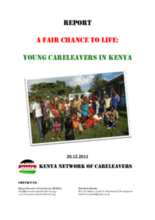Research examining the well-being and situation of young people leaving institutional care in Africa remains a little noticed field of study. There is hardly any research documenting young people‘s transitions from care to adulthood in the sub-Saharan context, especially in Kenya, there are no policies or regulations on after care life for young people who have exited institutional care.
The study wishes to improve the understanding of the experiences of careleavers in Kenya during the transition process, by allowing them to have their own voices heard. In so doing, the research concentrates on building a holistic insight into the young people‘s social, economic and cultural circumstances. The study is concerned with documenting the young people‘s own views of what has happened during the time of leaving care and afterwards. Moreover, it explores in-depth the experiences of care leavers during the dynamic phase following their separation from an institutional care setting. It argues that many care leavers end up finding themselves in a difficult transition process blurring the boundaries between youth and adulthood.
The study suggests that the majority of the young people who participated are somehow stuck in transition and are vulnerable to exclusion from a society they neither feel well equipped nor prepared for having left a care institution. Many of them lack social and psychological coping strategies; they do not have adequate jobs or job skills; and there is no safety net or supportive network in the communities that could assist the young people when leaving a care institution. Generally, it is understood that a person who turns 18 does not need any assisting services. However, KNCL believes that at this crucial stage young people need support, as many of them are searching their identity and at the same time trying to be independent.

